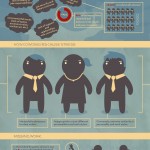 “Karoshi” is what they call it in Japan. Death by overwork. It’s in the infographic in case you want to click on the infographic. Some kids in Japan decide they don’t want to die because of work, but they don’t know how else to get on with their lives. These young men — usually they are young men — live lives of despondent seclusion in their parents’ homes where they play video games and are fed in their rooms on trays brought by their mothers. They are called “hikikomori” and you can read all about them in Larissa MacFarquhar’s New Yorker Article (if you subscribe to the New Yorker.) You might think it’s strange that the Japanese have words for these things, until you realize that we do not. (I was about to say “we Americans” as if people all over the world were hanging on each and every entry on this blog.)
“Karoshi” is what they call it in Japan. Death by overwork. It’s in the infographic in case you want to click on the infographic. Some kids in Japan decide they don’t want to die because of work, but they don’t know how else to get on with their lives. These young men — usually they are young men — live lives of despondent seclusion in their parents’ homes where they play video games and are fed in their rooms on trays brought by their mothers. They are called “hikikomori” and you can read all about them in Larissa MacFarquhar’s New Yorker Article (if you subscribe to the New Yorker.) You might think it’s strange that the Japanese have words for these things, until you realize that we do not. (I was about to say “we Americans” as if people all over the world were hanging on each and every entry on this blog.)
It’s not as if we don’t have young people (or rapidly-approaching-middle-age people) who are anxious and depressed about what their personal and professional lives hold. In 1992 when Chris McCandless wandered off into the wild, it seemed like a difficult choice for a lot of people to comprehend. Twenty years later it seems somewhat hard to comprehend that a whole generation has not disappeared into buses in Alaska. In many ways, we have.
There is a generation of Americans that grew up in the shadow of the baby boom, learning that ours was a unique nation at a unique point in history. Ours to inherit were a country and a set of institutions built on Manhattan bedrock and California gold. What we did not know was that the gold was almost spent on Saudi Arabian oil and skyscrapers built on Dubai sands do actually reach higher than the ones below Canal Street. We will be the first generation in the history of the United States to be less affluent than our parents, and the institutions which we believed to be timeless are starting to show their age.
Government, finance, media, religion, education, medicine, law, and so forth. Please pick the one which is not facing an existential challenge. Whistle blowers from surveillance agencies and people who actually read social media site privacy policies send public radio wonks into endless conversations about the nature of self while all of us bozos here on the bus are trying to get a decent cup of coffee between the last conference call and the next google hangout. If we can perceive the tragedy when a brilliant spark is extinguished in the Denali wilderness, why do we not see it when the office parks are engulfed with flames?